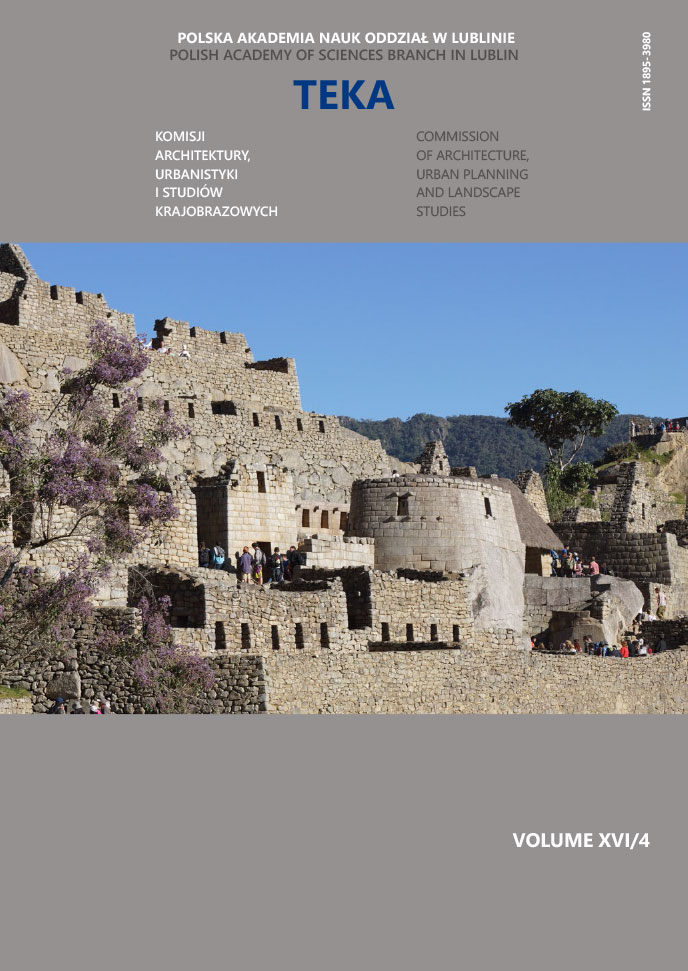The use of laser scanning in the survey of the postern of the Kłodzko Fortress
Article Sidebar
Issue Vol. 16 No. 4 (2020)
-
The Torreón of Machu Picchu: an astronomical observatory?
Jacek Kościuk, Mariusz Ziółkowski7-31
-
The use of laser scanning in the survey of the postern of the Kłodzko Fortress
Piotr Gleń, Karol Krupa32-39
-
"Poplars and Cypresses” – that is the phenomenon of popularity of Populus Italica in the Kingdom of Poland in the 19th century
Kamila Lucyna Boguszewska40-51
-
Interiors in the Polish feature film of the 1960s as a source of knowledge and a reference point for contemporary architectural designs
Agata Gawlak, Magda Matuszewska52-58
-
Two churches, two architects, one profile – national style and “borrowing” forms in the sacred architecture of the Second Polish Republic
Anna Tejszerska59-69
-
Landscaping of green areas in the urban layout of midtown Lublin
Natalia Przesmycka, Kamila Boguszewska70-85
-
The ideal village – spatial arrangement and building of Paproć Duża
Małgorzata Dolistowska86-99
-
The Message of the 16th Venice Biennale of Architecture 2018 Freespace compared to the message of the other editions
Hubert Trammer100-105
-
Transformations of urban space, place and non-place
Dariusz Gaweł106-113
-
Stylistic trends in historic interiors of buildings located in selected spa towns in the Hutsul region – an outline of the issues
Jacek Czubiński114-127
-
Participatory design of healthcare facilities using virtual reality
Piotr Springer128-136
Archives
-
Vol. 18 No. 4
2022-12-30 5
-
Vol. 18 No. 3
2022-12-27 5
-
Vol. 18 No. 2
2022-12-27 5
-
Vol. 18 No. 1
2022-12-27 4
-
Vol. 17 No. 4
2021-12-30 11
-
Vol. 17 No. 3
2021-12-30 9
-
Vol. 17 No. 2
2021-12-30 8
-
Vol. 17 No. 1
2021-12-30 8
-
Vol. 16 No. 4
2020-12-30 11
-
Vol. 16 No. 3
2020-09-30 10
-
Vol. 16 No. 2
2020-06-30 11
-
Vol. 16 No. 1
2020-03-31 10
-
Vol. 15 No. 4
2019-12-30 6
-
Vol. 15 No. 3
2019-10-31 9
-
Vol. 15 No. 2
2019-06-28 12
-
Vol. 15 No. 1
2019-03-29 13
-
Vol. 14 No. 3
2018-10-28 14
-
Vol. 14 No. 2
2018-06-29 14
-
Vol. 14 No. 1
2018-03-30 13
Main Article Content
DOI
Authors
Abstract
This article presents the significance of laser scanning as a method of acquiring spatial data and the significance of this method during the process of survey of historic monuments. The authors of the paper focus on the survey of the postern located under the eastern slope of the Kłodzko Fortress and connecting the town with the upper levels of the fortification. With the use of laser scanning, a three-dimensional image of the postern was obtained. Based on the results of measurements, it is possible to specify the dimensions of tunnel elements which are difficult to measure, such as the buried fragment of the postern and the height of the embankment located above the tunnel. The research conducted by the authors of the article has been juxtaposed with the available archival materials concerning this part of the Kłodzko Fortress.
Keywords:
References
Piotr Gleń, Karol Krupa, Comparative analysis of the inventory process using manual measurements and laser scanning, Budownictwo i Architektura 18(2) (2019), p. 21−30 accessed: 10.35784/bud-arch.552.
Gruszecki A., Specyfikacja zasobów architektury obronnej w Polsce, ich ochrony i zagospodarowania w: M.L. Lewicka [ed.], Ochrona zabytków architektury obronnej, Giżycko 1997, p. 19.
Kartograficzne udokumentowanie zasobów budownictwa obronnego w Polsce. Połowa XVIII w. – XX w., research project KBN no. 7T07F03610, joint publication under supervision of A. Gruszecki, Warszawa 2007.
Boroń Adam, Rzonca Antoni, Wróbel Andrzej, The digital photogrammetry and laser scanning methods used for heritage documentation (in:) Polskie Towarzystwo Informacji Przestrzennej, Roczniki Geomatyki 2007, Vol. V, book 8, p. 129.
Guerquin B., Zamki Śląskie, 1957.
Broniewski T., Śląsk w zabytkach sztuki, 1963.
Triller E., Rocznik Ziemi Kłodzkiej 1958, Vol. III 1959.
Bukal G., Niderlandyzm w sztuce polskiej, 2000.
Jędrysiak T., Mikos von Rohrscheidt A., Militarna turystyka kulturowa, PWE, 2011.
http://www.dawnekłodzko.pl, accessed: 09.03.2019.
http://www.zamkipolskie.pl, accessed: 09.03.2019.
Decision KL-V-1/61/30 of 13th May, 1960 r. on entry to the Register of Historic Monuments.
Piotr Gleń, Karol Krupa, The use of secondary build-up in historical fabric based on the donjon of Kłodzko Fortress / E3S Web of Conferences – 2018, vol. 49, s. 1−10, DOI: https://doi.org/10.1051/e3sconf/20184900031. DOI: https://doi.org/10.1051/e3sconf/20184900031
Gleń P., Krupa K. The use of 3D scanning for the inventory of historical buildings on the example of the palace in Snopków. Teka Komisji Architektury, Urbanistyki I Studiów Krajobrazowych, 2020, 15(2). DOI: https://doi.org/10.35784/teka.889. DOI: https://doi.org/10.35784/teka.889
Michałkowska K. [ed.], Modelowanie i wizualizacja danych 3D na podstawie pomiarów fotogrametrycznych i skaningu laserowego, 2015.
Zapłata R., Pomiar, inwentaryzacja i diagnostyka drewnianej architektury wernakularnej – wybrane zagadnienia zastosowania technologii skanowania naziemnego, Budownictwo i Architektura 14(4), 2015.
Filipowski Szymon, Laser scanning in architectural surveying – popular solutions and proposal for improvement, PUA 1/2018, p. 97.
Article Details
Abstract views: 421
License

This work is licensed under a Creative Commons Attribution-ShareAlike 4.0 International License.


